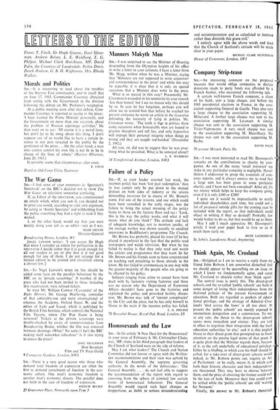Failure of a Policy SIR,—If, as your leader asserted last
week, the incomes policy has been 'lost past redemption,' then its loss cannot only be put down to the mutual distrust on both sides of industry or the unions demanding increases far in excess of Mr. Brown's norm. For one of the reasons, and one which could have been remedied in the early stages, was the failure to bring the actual meaning of the policy home to those on the factory floor and say: 'Look, this is the way the policy works and what it will mean; what do you think?' The attitude and lack of adequate knowledge, not to mention apathy, of the average worker was shown recently in unedited interviews in Rediffusion's programme The Crunch.
Mr. Brown has probably placed his trust (if he has placed it anywhere) in the fact that the public read newspapers and watch television. But what he has failed to realise is that they only read and watch the articles and programmes that they want. So far Mr. Brown and his friends seem to have concentrated on teaching and preaching to those already in the know. He has failed to communicate in any way with the greater majority of the people who are going to be affected by his policy.
Subjects ranging from crime to cancer have been dealt with by lecturers visiting factories and there was no reason why the Department of Economic Affairs shouldn't have gone to the factories and explained the policy and provoked healthy discus- sion. Mr. Brown may talk of 'sinister conspiracies' by the City and the press, but he has only himself to blame in the main if the incomes policy has failed.
T. G. PHILPOT
70 Boscobel House, Royal Oak Road, London, E8






























 Previous page
Previous page